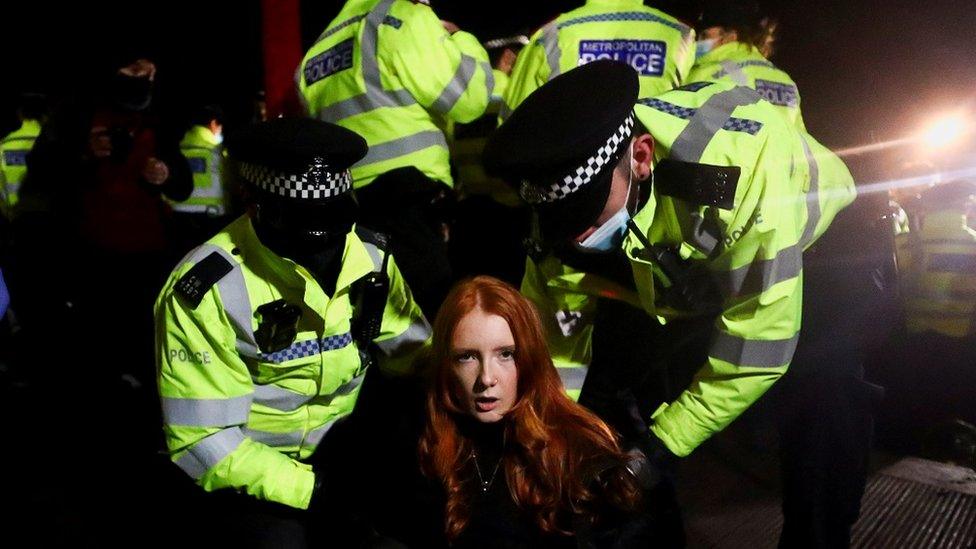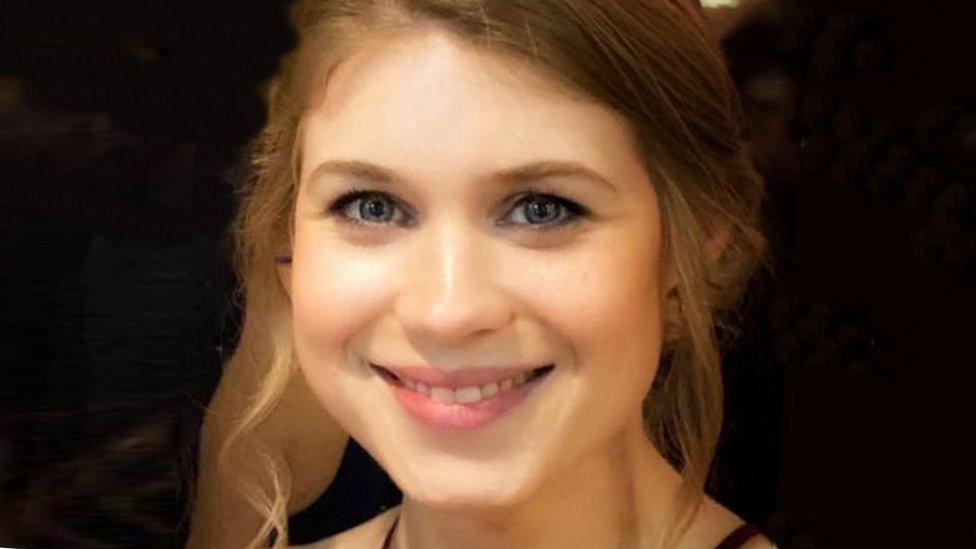Sarah Everard vigil: Police officers 'contacted arrested woman on Tinder'
- Published

Patsy Stevenson was issued a £200 fixed penalty notice following her arrest
A woman who was pictured being arrested at the Sarah Everard vigil has said "about 50" police officers have since contacted her via a dating app, leaving her "terrified".
Patsy Stevenson, 28, said the officers approached her on Tinder after she was handcuffed at the vigil on 13 March.
She said they knew she was "fearful of police" and had done it "for a reason".
The Met said its officers "must abide by our high standards of professional behaviour, both on and off duty".
Hundreds attended the vigil on Clapham Common in south London following the death of Ms Everard, who was murdered by Met Police officer Wayne Couzens after he abducted her while she was walking home.
The event had been cancelled after the Met said it would be illegal under lockdown restrictions.
Ms Stevenson said the event was "a turning point", where "everyone realised we actually we all go through the same things", but the "sombre atmosphere... turned very scary very quickly" after police started trying to disperse the crowd.
She was handcuffed and held down by two officers, and was also issued with a £200 fine.
She has since launched legal action against the Met Police over the arrest.
'Death threats'
She said that since the arrest, "about 50" police officers and security guards had approached her via the dating app.
"They were all in uniform on their profiles or it said 'I'm a police officer'," she said.
"I do not understand why someone would do that.
"It is almost like an intimidation thing, saying 'look we can see you', and that, to me, is terrifying.
"They know what I went through and they know that I'm fearful of police and they've done that for a reason."
Patsy Stevenson explains why she felt the vigil was important.
Ms Stevenson said she had also become the focus of internet conspiracies since her arrest and "can't count the amount of death threats I've had".
She said people had claimed she was a "crisis actor" paid to attend the vigil and get arrested to legitimise attacks on the police.
She added that many of the threats had been about kidnapping her.
"Now there's always that fear when I'm out and I see someone staring at me," she said.
"I just want to be able to live the way you live without fear.
"But then again, I'm a woman."

Sarah Everard was abducted and killed by serving police officer Wayne Couzens
Ms Stevenson said she was not "anti-police" and had reported the threats, which are being investigated, though had not reported the dating app contacts.
She said the police needed to start "taking accountability" for officers' actions and the Met's advice that women should flag down a bus if they have concerns when stopped by an officer was "part of the problem".
"Stop telling women how to change their behaviour just to stay alive," she said.
"If they started looking into it properly and... listening to people's concerns and then enacting change, we would be able to trust them more."
The Met said Ms Stevenson should "please contact us and provide us with more information so we can work to establish if any MPS officer is involved [and] whether any misconduct may have occurred.
Met Police Commissioner Dame Cressida Dick, who has rejected calls to resign, confirmed on Monday there would be an independent review into the force's standards and culture and Home Secretary Priti Patel also said an inquiry into the "systematic failures" that allowed Wayne Couzens to continue to be a police officer would be launched.

Analysis
By Lauren Moss, BBC London Home Affairs Correspondent
The death threats and abuse Patsy Stevenson says she's received come at a time when scrutiny on the treatment of women is higher than ever - not just by the police, but by society in general.
The photos of her being arrested at the vigil caused shock across the country and while a police watchdog found officers acted appropriately in what the Met called an "extraordinarily challenging circumstance", Her Majesty's Inspectorate of Constabulary did say public confidence in the force had suffered as a result.
The inquiry into how killer Wayne Couzens was able to be a serving police officer and a review into culture within the force may go some way to reassuring people that all in authority believe such appalling crimes must never be allowed to happen again, but it goes far beyond that.
Women like Patsy say they need to see action, not only hear words.
Patsy's death threats prove it's not just the streets that need to be safer, but the social media platforms many people use every day and that is an even wider issue that goes far beyond policing.
- Published25 June 2021

- Published14 March 2021
- Published30 September 2021
